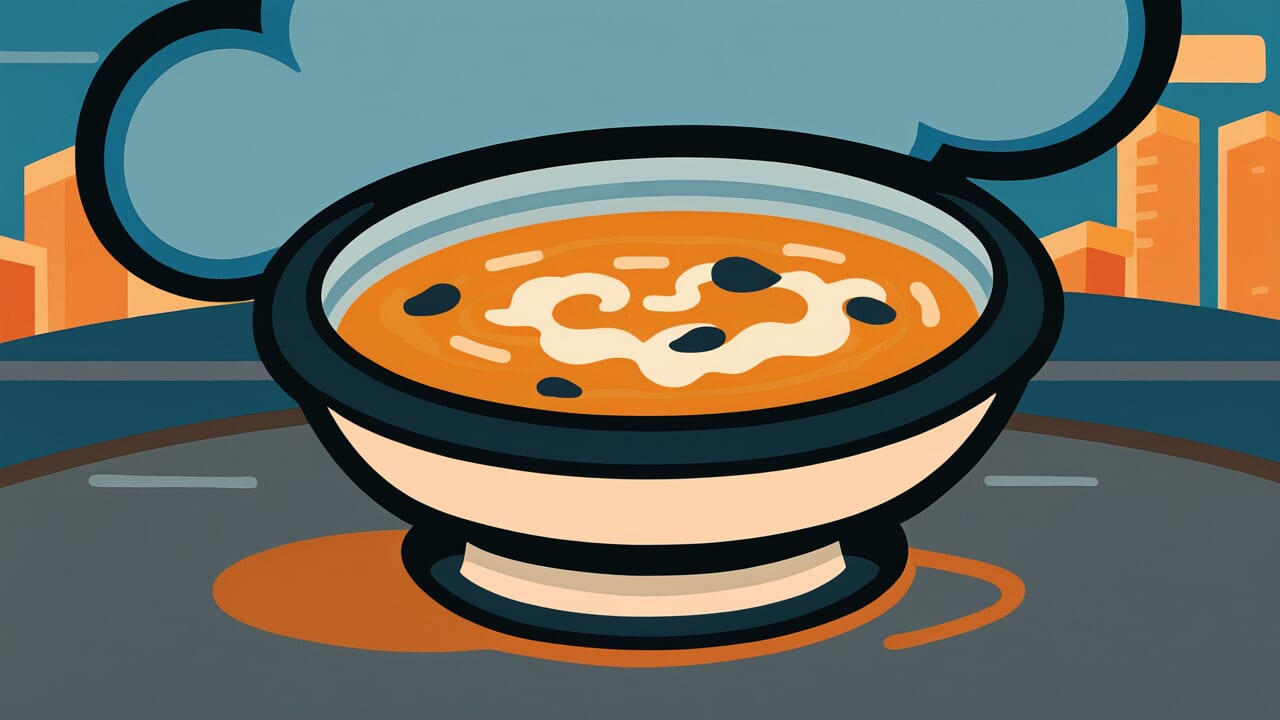How to Read “Soup on clouds”
Kumo ni shiru
Meaning of “Soup on clouds”
“Soup on clouds” is a metaphor for actions that have absolutely no effect or meaning. If you try to pour soup onto clouds high in the sky, it won’t reach them. Even if it did, nothing would come of it.
This proverb describes futile efforts and pointless actions that can’t produce any results.
You might use this expression when someone ignores your advice completely. It also fits situations where people take measures that clearly won’t work.
The proverb doesn’t criticize effort itself. Instead, it points out when the direction is wrong or when success is simply impossible from the start.
Even today, “Soup on clouds” perfectly describes situations where your efforts get no response. It captures that feeling of “it’s useless no matter what I do.”
Origin and Etymology
No clear historical records explain where “Soup on clouds” came from. However, the structure of this phrase offers interesting insights.
Let’s first think about clouds themselves. Clouds float high in the sky, far beyond our reach. More importantly, they have no solid form—they’re just collections of water vapor.
Now imagine trying to pour soup onto a cloud. Soup is liquid, so it couldn’t reach the clouds in the first place. Even if it somehow did, the formless cloud couldn’t catch it. The soup would simply fall straight down.
This expression shows how carefully Japanese people observed nature in ancient times. By using clouds as an example, they created a vivid and memorable way to describe useless effort and ineffective actions.
Similar proverbs exist, like “nailing into rice bran” or “pushing against a curtain.” But “Soup on clouds” emphasizes both distance and formlessness even more strongly.
The phrase captures double meaninglessness—trying to do something to an object that’s both unreachable and shapeless. This double layer makes the proverb especially powerful and memorable.
Usage Examples
- No matter how many times I warn him, it’s like soup on clouds—he shows no sign of changing
- Running ads that get zero response is like soup on clouds
Universal Wisdom
“Soup on clouds” teaches us about a deep human trait—our inability to stop ourselves from trying. Sometimes we take action even when we know it won’t work. Our heads understand it’s pointless, but our hearts can’t accept it.
This proverb was born from real human experience. When we desperately want to reach someone important, change a situation, or fix something, we often take ineffective actions.
The stronger our feelings, the more we do things that don’t work. Parents repeat the same words to rebellious teenagers. People send message after message to lovers who’ve left. We act even when we know it’s useless.
Our ancestors understood this human nature. They expressed its emptiness through the striking image of “Soup on clouds.”
But this proverb also contains kindness. It doesn’t blame people for wasted effort. Instead, it gently says, “That’s like pouring soup on clouds.” It gives us a chance to step back and see our situation more clearly.
Sometimes we need words that help us view our actions objectively. This proverb might be a gift from our ancestors—a tool for regaining calm perspective.
When AI Hears This
When you try to pour soup on clouds, gravity pulls the liquid down. It slips between the tiny water droplets and ice crystals that form the cloud, then falls to earth.
Thermodynamics reveals something remarkable about this. The soup molecules that sat orderly in a bowl begin scattering the moment they’re released into air. They can never return to their original state. This is entropy increase—the one-way nature of all matter toward disorder.
The perfect irreversibility of this action deserves attention. When liquid enters gas, molecules scatter in all directions at about 500 meters per second. Within seconds, they spread across thousands of cubic meters of space.
Even if you could record every molecule’s position and velocity, the probability of gathering them back into a bowl would be one in ten to the trillionth power. Physically possible but requiring more time than the universe’s lifetime.
Human effort follows the same structure. When you pour concentrated labor and resources toward ineffective targets, they scatter into space and never return.
The proverb points to more than simple waste. It identifies the absolute irreversibility that thermodynamics proves. Universal law expressing human folly in four characters.
Lessons for Today
“Soup on clouds” teaches modern people the importance of pausing to think before acting. Effort is beautiful, but misdirected effort steals your precious time and energy.
Modern society often treats “working hard” as a virtue. But this proverb offers a different perspective. What matters first is determining whether the other person or situation can actually receive what you’re offering.
Sending one-way messages endlessly on social media, forcing proposals on unprepared people, acting while ignoring timing—all these can become “Soup on clouds.”
So what should you do? The answer is creating conditions where your efforts can work. Wait for the moment when someone’s heart opens. Consider different approaches. Or have the courage to choose doing nothing right now.
Sometimes “not acting” becomes the wisest action. To make your efforts bear fruit, why not start by preparing the soil first?



Comments